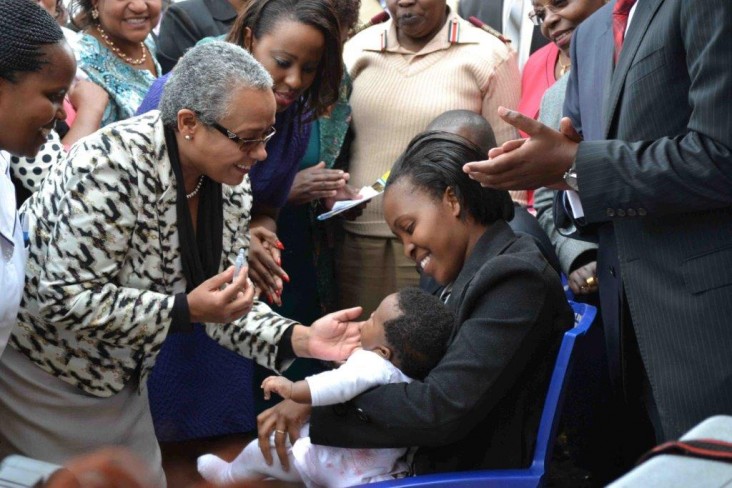
For Immediate Release
July 16, Machakos County, Kenya – U.S. Agency for International Development (USAID) Mission Director Karen Freeman joined the First Lady of Kenya, Margaret Kenyatta and Cabinet Secretary, Ministry of Health, James Macharia to launch the inclusion of the rotavirus vaccine into the Kenya Expanded Program on Immunization.
The introduction of the rotavirus vaccine will address a major killer of children, diarrheal diseases. Diarrhea is a major cause of childhood illnesses and death. The U.S. Centers for Disease Control and Prevention (CDC) in partnership with the Kenya Medical Research Institute (KEMRI) participated in the global studies that showed rotavirus is the leading cause of severe childhood diarrhea. Kenya was also one of the five countries globally where vaccine trials for rotavirus were conducted. The introduction of the rotavirus vaccine will complement other proven public health interventions: good sanitation, hygiene and access to safe drinking water.
“USAID is investing $4 million this year in Kenya’s immunization program. Childhood immunization programs provide a very high return on investment. Vaccination services prevent illnesses, which reduce direct health costs and save millions of shillings in indirect costs. More importantly, vaccination services save lives,” said Ms. Freeman.
The Kenya Expanded Program on Immunization was introduced in 1980 to address the then six common causes of childhood mortality. Over time, the program has grown to incorporate new vaccines that address more causes of childhood mortality. Vaccination services are available for all children, however, each year approximately 20 percent of Kenyan infants are not fully immunized. USAID is supporting improvement of data collection to better identify these children and helping in the procurement of vaccines to support outbreak responses. The impact of the immunization program can be appreciated by the near elimination of diphtheria and pertussis, which are two diseases that ravaged children before the immunization program was launched in Kenya.
Prior to the launch event, Dr. Alfred Nganga Mutua, Governor of Machakos County, took the guests on a tour of the Machakos Level 5 Hospital.
Related Press Releases
- USAID and IREN announce winners of East Africa Postharvest Technologies Competition 2017
- Power Africa Launches New Partnership with the Nile Basin Initiative and the Nile Equatorial Lakes Subsidiary Action Program
- USAID and COMESA Sign $77 Million Partnership Agreement to Strengthen Regional Development







Comment
Make a general inquiry or suggest an improvement.